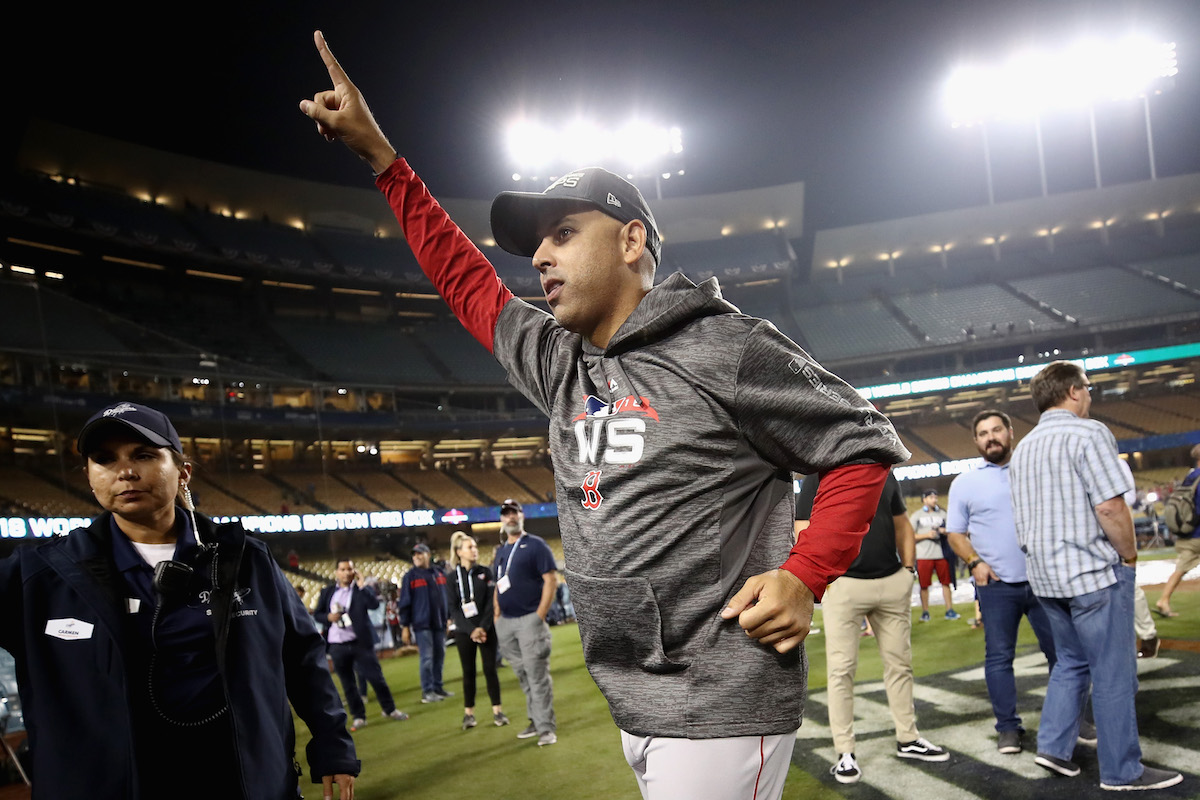

Boston Red Sox manager Alex Cora celebrates his team’s 5-1 win over the Los Angeles Dodgers in Game Five of the 2018 World Series at Dodger Stadium on October 28, 2018. (Photo by Ezra Shaw/Getty Images)
After a long road to getting one of those precious 30 plum jobs in Major League Baseball, Alex Cora is finally a genius.
Yeah, he got handed the keys to a sweet ride—Mookie Betts in the outfield, J.D. Martinez at DH, an infield with talent and youth, Chris Sale on the mound and a front office willing to spend when needed.
But Cora’s crew cruised to 108 wins, dominated the playoffs and won the World Series in five games, beating the defending World Champion Astros, a 100-win Yankees team and the back-to-back NL pennant-winning L.A. Doyers along the way.
Managers get credit for leading a historically great team, so Cora should too. Even through the lens of sabermetrics, which states even the best managers normally can only win its team a couple more games a year, this team outperformed its Pythagorean winning percentage by five games.
From a baseball eye-test standpoint, Cora’s lineup always grinded, worked counts and stayed competitive in seemingly every game. In the playoffs, he somehow got guys like Joe Kelly, Matt Barnes and his suddenly shaky closer Craig Kimbrel to outperform the feared Yankees bullpen. Cora certainly showed more sense of urgency in that Yankees ALDS matchup than fellow rookie manager Aaron Boone.
Cora even coaxed David Price into pitching well in the playoffs.
So like I said, managers get credit for leading a historically great team, so Cora should too.
A few more points to chew on in light of Cora’s achievements here:
First, let’s give winter ball and the World Baseball Classic props for giving guys like Cora valuable pro baseball management experience. In 2017, he was general manager of both Team Puerto Rico in the World Baseball Classic and Caribbean World Series champion Caguas Criollos, his hometown team. Overseeing that Puerto Rico WBC squad with guys like Javier Baez, Carlos Correa and Francisco Lindor but with a short pitching staff certainly helped Cora cut his teeth juggling such a roster for a short-series environment. La Liga De Béisbol Profesional Roberto Clemente, scouts will say, is equal to minor league A ball, so no superstar lineups in the island league. While leading Caguas, Cora evaluated young and veteran talent, structured a roster and coaching staff and ran a franchise with limited resources—all valuable experience in preparation of this Red Sox role.
Second, unlike many former and current MLB Latino players, Cora played college ball (in his case, at the University of Miami) and had an on-air stint at ESPN. So coupling this with his winter ball and WBC background, Cora had to essentially develop a bilingual/bicultural baseball resume to put himself in a strong position to get this Red Sox job. Sadly, that large population of Latino players coming up in the Dominican or Venezuelan academy systems won’t likely ever go to college, which might hurt their managerial chances in the future.
.@nickcafardo: Alex Cora hit .400. Really. If managers could be assigned a batting average, then Cora would be Ted Williams.
That’s how good he was in leading the #RedSox to a World Series championship in his first season as a manager.https://t.co/hMEVsO4yhC pic.twitter.com/KHt9EwpKuW
— Boston Globe Sports (@BGlobeSports) October 29, 2018
Third, aspiring managers may want to go to that SABR Convention next year. As the game keeps moving hard towards an analytics approach, those from a more old-school baseball heritage need to be open to learning this emerging component of player evaluation and game management. New Toronto Blue Jays manager and fellow Boricua Charlie Montoyo is from that traditional, pay-your-dues-in-the-minors training, having won close to 2,000 games before working with the Tampa Rays, starting in 2015. To Montoyo’s credit, he was open to learning the data-driven strategies and now has reaped the benefits.
Finally, Cora’s 2018 performance and Toronto’s hiring of Montoyo notwithstanding, the number of Latino MLB managers will certainly fluctuate. Managers will get fired. Ask Boston fans about John Farrell who won the 2013 World Series in his first year as manager, then was fired by 2017. There is one Latino MLB owner (Arte Moreno of the L.A. Angels). There is one Latino general manager (Al Avila of the Detroit Tigers). The real progress will come from ex-players gaining experience and investment stakes in hopes of getting more leadership roles in all levels of professional baseball. Baseball decision-making largely comes from the owner’s box and the GM’s office, not the dugout.
#Orgullo #Caguas #Champions #RedSox ?????? @ac13alex pic.twitter.com/7PxuLsZZDw
— Julio Ricardo Varela (@julito77) October 29, 2018
Latino players and aspiring baseball executives would be smart to take Cora’s bilingual/bicultural playbook towards those ultimate goals.
Michael Collazo is President & CEO of @DahdayCom, a ticket brokerage. A veteran of the sports & entertainment industry, he has worked for the Cleveland Cavaliers, the former Newark Bears (minor league baseball) and Prudential Center. Follow him on Twitter @Mcollazo215.


